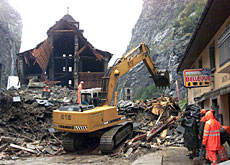Back to the drawing board

The Swiss have thrown out a government plan to use proceeds from the sale of excess gold reserves for humanitarian projects.
Voters rejected two proposals on how to spend the money – a clear signal that the government needs to come up with new ideas about what to do with the cash.
Voters turned down the government plan to divide the money equally among the state pension scheme, the cantons and the so-called Solidarity Foundation, which would support good causes both at home and abroad.
The Swiss president, Kaspar Villiger, expressed his disappointment and said the allocation of the gold proceeds would have to be analysed once again.
However, he added that the government would take its time to think about a new plan. “At the moment we are not doing anything,” Villiger said.
He said that the Swiss had the right to reject government proposals and pointed out that the result was not an indication that the people were opposed to humanitarian projects.
Close result
The result was close – just under 52 per cent rejected the initiative. Voter turnout was slightly higher than normal at 44.1 per cent.
Former Swiss president, Arnold Koller, who officially proposed the idea for the Solidarity Foundation in 1997, said he was “disappointed but not surprised” that it was rejected.
He said Switzerland was experiencing economic uncertainty and in such situations, people think of themselves before showing solidarity with others.
The director of the Solidarity Foundation project, Walter Schmid, also expressed his deepest regrets about the outcome of the vote.
“It’s certainly not a good day for Switzerland. I think it is a signal for the actual situation in the country. People are scared about the future and the economic prospects and are in a general mood to say no,” Schmid told swissinfo.
Counter-proposal
A counter-proposal, by the rightwing Swiss People’s Party, to spend all the money on the state pension scheme was also thrown out.
Christoph Blocher, who led the opposition to the Solidarity Fund, and whose party sponsored the counter-proposal, said his main aim had been achieved – “the unspeakable Solidarity Foundation cannot be realised”.
Both proposals needed a majority of voters and cantons to pass (see related story “Cantonal majority principle”).
Wartime past
Supporters of the Solidarity Foundation had argued that a rejection would have a negative impact on Switzerland’s image, which is still recovering from revelations about the country’s wartime past in the 1990s.
The government has consistently denied that the Solidarity Foundation had anything to do with making reparations for past mistakes.
But since it proposed the idea in 1997 – at the height of the scandals over Holocaust-era assets – rightwing opponents, such as Blocher, have accused the government of caving into foreign “blackmail”.
Rolf Bloch, former head of Switzerland’s Jewish communities in the 1990s, told swissinfo that the rejection of Solidarity Foundation, although disappointing, was not likely to damage Switzerland’s image abroad.
“I’m disappointed – I thought it would send out the right sign to the world that Switzerland had a feeling of solidarity and I was very much in favour of it.
“I don’t think it’ll send out a negative image about Switzerland – but it would have sent out a very positive image if the government proposal had been accepted.”
As to why the Swiss rejected the Foundation, Bloch said: “One of the reasons was that people are feeling more insecure about the future of pension plans.”
He added that the outcome did not mean the Swiss “no longer want to give a sign of solidarity. I’m sure that, in future crises, the Swiss will contribute to international solidarity.
“But they just didn’t want to do it under pressure from outside. At the time [of the Holocaust-era scandals], there was too much pressure from abroad.”
How to spend it?
Shortly after the result of the vote became known, political parties were already putting forward alternatives on how to spend the money from the gold reserves.
The main centre-right Radical party said two-thirds should be handed to the cantons, with one third for the state pension.
The People’s Party agreed. Parliamentarian, Luzi Stamm, told swissinfo: “I think a good future solution would be to put two-thirds of the money into the pension plans and one-third into the cantons.”
He added that taxes would have to be raised if the money was not invested in state pensions.
The left-leaning Social Democrats blamed the result on the Radicals and the People’s Party, and suggested the money now be used for an “innovation fund” to support education and research and to create jobs.
The Solidarity Foundation stood to receive a third of an annual figure of around SFr650 million, which is the interest on the capital derived from selling 1,300 tons of gold reserves held by the Swiss National Bank.
swissinfo
Swiss voters threw out two proposals on how to spend the proceeds from gold sales.
The result means the government will need to come up with new ideas about what to do with the money.
The man who launched the Solidarity Foundation said he was disappointed but not surprised.
The sale of 1,300 tons of gold reserves (around half the country’s total reserves) held by the Swiss National Bank is expected to raise SFr20 billion.
The Swiss government wanted the interest from this money – between SFr500 and 700 million – to be split equally between state pensions, the Swiss cantons, and humanitarian aid projects.
Switzerland tops the world in per capita gold reserves, even after the sale of 1,300 tons.

In compliance with the JTI standards
More: SWI swissinfo.ch certified by the Journalism Trust Initiative


You can find an overview of ongoing debates with our journalists here . Please join us!
If you want to start a conversation about a topic raised in this article or want to report factual errors, email us at english@swissinfo.ch.